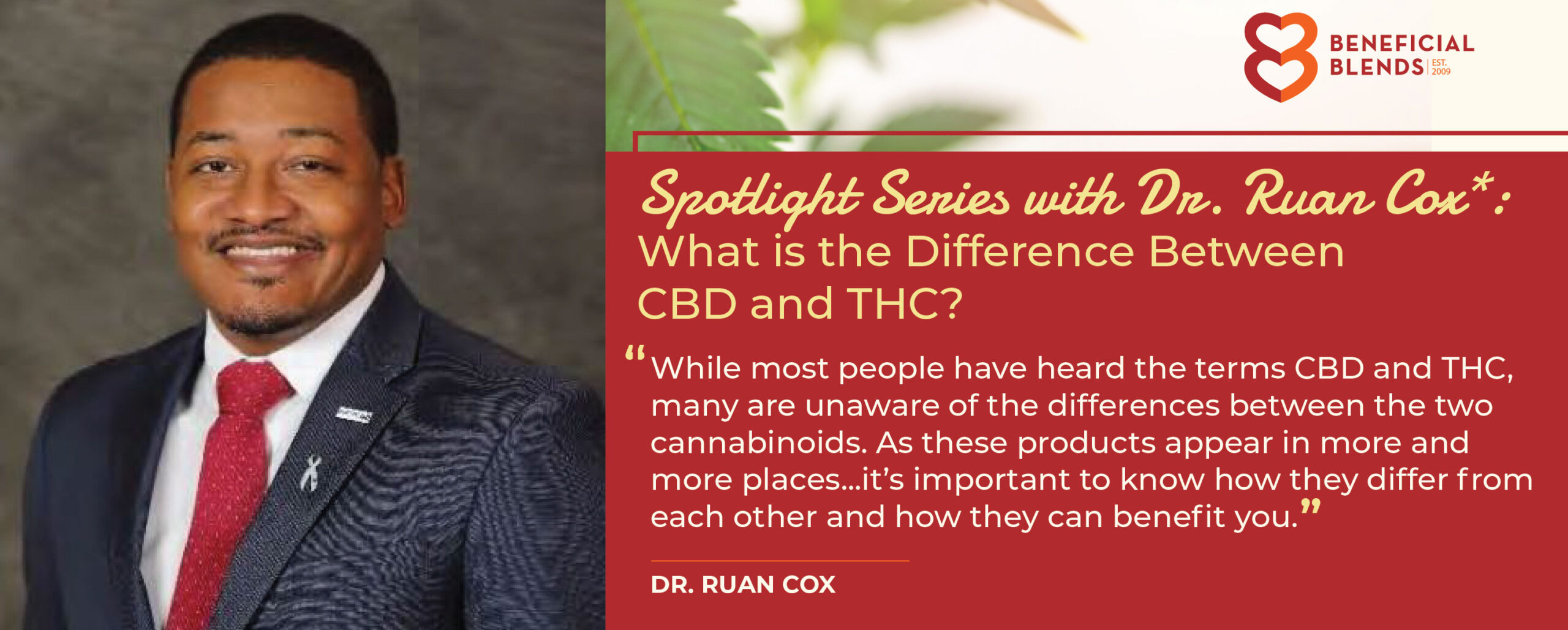
Spotlight Series with Dr. Ruan Cox*: What is the Difference Between CBD and THC?
CBD vs THC-Key Takeaways
- CBD and THC are NOT the same thing. They have different uses and effect the body in different ways.
- CBD does not get you ‘high’ like THC.
- CBD products are legal, however they are not regulated by the FDA.
- CBD can be used for stress, sleep, and inflammation, while THC in prescription doses may be used for nausea, pain, and appetite.
CBD vs THC
“While most people have heard the terms CBD and THC, many are unaware of the differences between the two cannabinoids,” states Dr. Ruan Cox. “As these products appear in more and more places, including online, on the news/politics, groceries stores, supplement stores, and retail spaces, it’s important to know how they differ from each other and how they can benefit you.”
CBD and THC Become Legal in Some States
For many years all cannabis plants were considered illegal due to the THC content, unfortunately making CBD illegal as well. THC and CBD were completely illegal for many years; until recently, where both medical and recreational use has become legal in a number of states across the US. In the cannabis plant family, a plant is considered hemp or marijuana based on the amount of CBD and THC found in it. According to the 2018 Farm Bill, hemp-based products that come from hemp plants with <.3% of THC are considered legal. This was a huge win for the hemp industry! There was finally a baseline for what is legal hemp (CBD) and what is marijuana (THC).

Differences Between CBD and THC
There is so much ambiguity circulating about the difference between THC and CBD, with about 26% of adults thinking there are no differences between the two cannabinoids. However, there are differences between the plants, their chemical structure, the uses, effects, and products.

The Plant-CBD vs THC
According to Dr. Ruan Cox, the Cannabis plant contains over 115 different active chemical compounds. Because these compounds originate from plants in the Cannabis family, they are called Cannabinoids. Two of the most well-known Cannabinoids are delta-9-tetahydrocannabidiol (THC) and cannabidiol (CBD). As the nutraceutical market has boomed over the last five to ten years, the spotlight has recently come upon the beneficial effects of cannabis, especially the cannabinoids.
Hemp plants are usually characterized by their low THC content (<.3%), are taller with skinnier leaves, and many branches. Cannabis plants are shorter and bushier with fatter leaves. Most hemp plants can be grown outdoors with low maintenance, while cannabis plants need a lot of attention and controlled growing conditions such as proper lighting, temperature, and humidity in order to produce optimal results.
The Chemical Structure of CBD vs THC
Dr. Ruan Cox notes, “In terms of chemical structure, CBD has exactly the same chemical makeup as THC. Both compounds have 21 carbon atoms, 30 hydrogen atoms, and two oxygen atoms. The difference in the compounds is due to how these atoms are arranged. A change in the arrangement of a single atom accounts for the difference between CBD and THC.”

“This slight change in stereochemistry affects how these chemicals interact with their receptors in the human body”, adds Dr. Cox. These cannabinoids affect our body’s endocannabinoid system. While THC interacts with its natural endocannabinoid receptors in the body (CB1 vs CB2 receptor) in a traditional receptor and ligand format, CBD interacts with receptors a little differently. “Think of THC interacting with its receptors in a plug and outlet fashion. When you plug the cord into the outlet, there is power that is received, and the device can perform its intended function. That is how THC interacts with its receptor, the binding of THC leads to activation of the receptor and initiation of THC’s intended actions”, explains Dr. Cox. For CBD it is a bit different. CBD binds to these same receptors but at a different site. Normally a receptor can only hold its molecule of choice for a limited amount of time before the action becomes deactivated. When CBD binds to a different spot on the receptor, it allows the receptor to hold on to this corresponding molecule longer and produce a more sustained effect.
The Uses of CBD vs THC
CBD and THC are used and marketed for medical and recreational uses. Both cannabinoids have been approved in medications to treat several medical issues, including epilepsy (CBD) and nausea (THC).
Many people report using CBD for stress management, sleep, focus, and inflammation from regular activity. THC in prescription doses may be used for pain, nausea, low-appetite, stress, and recreational use by many users.
The Effects of CBD vs THC
“CBD, unlike Marijuana, does not illicit a euphoric response known colloquially as a “high”,” Dr. Ruan Cox reports. “This psychoactive feeling of euphoria generated by THC intake stems from THC’s impact on brain neurotransmitters.”
When THC is consumed, it binds to its receptors in the brain and stimulates the production and release of the neurotransmitter dopamine. This dopamine release creates the euphoric feelings, but also impairs motor control and can also cause stress, dizziness, or fatigue (drowsiness) depending on the amount and strain consumed. This can be quite harmful, especially to new users whose body is reacting to this compound for the first time. This release of dopamine is also seen in highly pleasurable behaviors such as eating or sex. When THC stimulates the neurons to initiate dopamine release, this surge of pleasurable feelings further “teaches” your brain to repeat this rewarding experience and may account for some addictive properties of THC. CBD, because it is not psychoactive, does not have the same negative effects. Instead, users of CBD report feeling energized, calm, increased mood, and focus.
The Products-CBD vs THC
There are numerous ways to consume both cannabinoids thanks to the legalization of CBD and THC in more and more places. Both can be smoked (flower), inhaled (vape), eaten (gummies, tablets, baked goods, butter), drank (oils, beverages, shots), and topically applied (creams, balms, lotions). With so many products on the market, there are countless products to try and find the best option.
*About Dr. Ruan Cox
Ruan Cox is a scientist, strategic partnerships and strategy professional, community builder and serves as a scientific advisor for Beneficial Blends. In this capacity, Ruan provides key insight to the Beneficial Blends leadership team on scientific innovation, product development, and important scientific communication to the community. Ruan earned a Bachelor of Science in Biology from the University of Florida and a Ph.D. in Molecular Medicine from the University of South Florida’s Morsani College of Medicine with a focus in Immunology. His insight and research on the potential health benefits and uses of CBD guide us as we move towards regulation of hemp plants, CBD, and THC.
